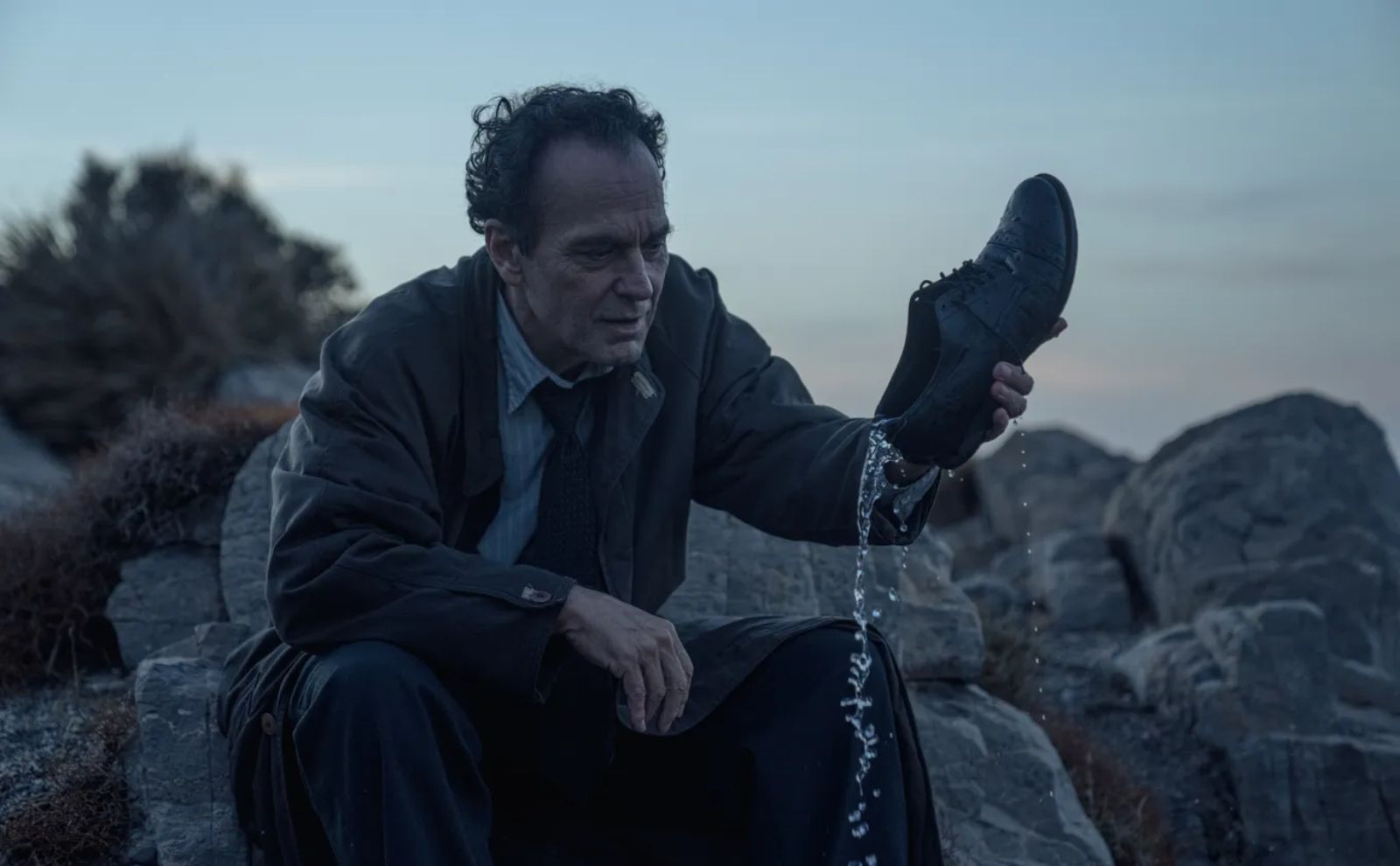
Cannes Review: Close Your Eyes is a Rewarding Late Work From Víctor Erice
One of the most prized moments of Howard Hawks’ macho manifesto Rio Bravo is when Dean Martin’s Dude kicks back, gazes lightheadedly at the ceiling, and moseys into a rendition of the western ballad “My Rifle, My Pony and Me,” accompanied on guitar and harmonica with a sense of second nature by Ricky Nelson and Walter Brennan. It’s an oasis of calm, of earned sentimentality, in the steeliest and most no-nonsense movie of its Hollywood era, and an emblem of the male camaraderie––sans queer shading, for sure––beloved of its most famous fans, most notably Quentin Tarantino.
Víctor Erice, however––in his first feature since a mysterious absence following 1992’s The Quince Tree Sun––has now made the ultimate homage. The centerpiece of his comeback film Close Your Eyes is its lead, melancholic filmmaker and writer Miguel Garay (Manolo Solo), busting out his acoustic during a communal dinner with his beachside neighbors and singing it pretty darn beautifully, in English, all the way through. It crystallizes the leitmotif emerging through a non-sexual love story between two men––one vanished and ostensibly departed, both mutually reliant on the other for their art. A musical duet, with vocalists alternating lines or verses, ideally nestles this resonance in the audience’s mind.
Curious, self-referential, and rich, Close Your Eyes has had a difficult passageway into the world, with its Cannes world premiere dogged by reports of conflicts over its runtime, its non-competition placement, and Erice’s own in-person boycott of the screening. Its final form also is a scarcely believable one, singular and self-possessed even amidst all the latter-day auteur work that’s screened in recent days: although it’s studded with other media, such as an unfinished film of Garay’s and trashy Spanish primetime TV, the main bulk is a pokily shot mystery “procedural,” told mainly in one-to-one dialogue scenes, shot in judicious singles with minimal coverage and muted lighting. But Erice is gradually able to accrete a rich character study of Garay and, yes, another meditation on the Grand Power of Cinema––not that we’re lacking in those at the moment––enriched by the fact that this theme, together with memory and longing, has long been the director’s modus operandi.
Close Your Eyes is a walking-pace voyage in search of the self and the Other, not so far in its overall thrust from Paris, Texas, down to its theme of amnesia and transformative final act. It concerns Garay’s estrangement from and search for his best friend and collaborator Julio Arenas (José Coronado), a dashing actor and fellow navy vet who suddenly goes missing on the set of Garay’s feature The Farewell Gaze, itself a story about recovering a lost daughter and observing its characters’ exiled aftermath, following their roles on the leftist side of the Spanish Civil War (unlike Erice’s first, classic feature The Spirit of the Beehive, major reconsiderations of Spain’s fascist past are not the focus).
A popular Spanish documentary series called Unsolved Cases has dedicated an episode to Arenas, so while admittedly tempted by the handsome interview fee, Garay assists the project in good faith, successively reuniting with the various players from the time––including an emotive meeting with Ana (Ana Torrent, the iconic lead of Beehive), Julio’s daughter––in tête-à-téte scenes that provide helpful exposition for the audience and create a richness of foregrounded detail that evokes a novel, maybe a good one of the UK Booker Prize-winning variety. Not for nothing Garay’s willingness to direct films ended with his friend’s traumatic disappearance and he set to spending the ensuing decades writing fiction, and also fishing, in that bohemian beachside community.
Erice and co-writer Michel Gaztambide satisfyingly resolve the primary mystery while letting possible accompanying details and circumstances swim teasingly in our minds. Appropriate for a film made by a director of his age, and not so far in emphasis from Pedro Almódovar’s Pain and Glory, we’re granted a precise sense of looking back on one’s own brushes with greatness and also relevance, but also a broader inspection of the community you’ve grow up alongside, with the indignities of aging, alcoholism, and potentially dementia very well-observed. The uplifting finale, revolving around an archival screening at an old relic of a cinema, has a saccharine, unwanted air of Cinema Paradiso, but is otherwise the indisputable way to cap off this winningly satisfying and cerebral movie, perhaps Erice’s career as a whole. In his four main features, including this, he justifies a major reputation by offering something special each time through.
Close Your Eyes premiered at the 76th Cannes Film Festival.
Grade: B+



































































